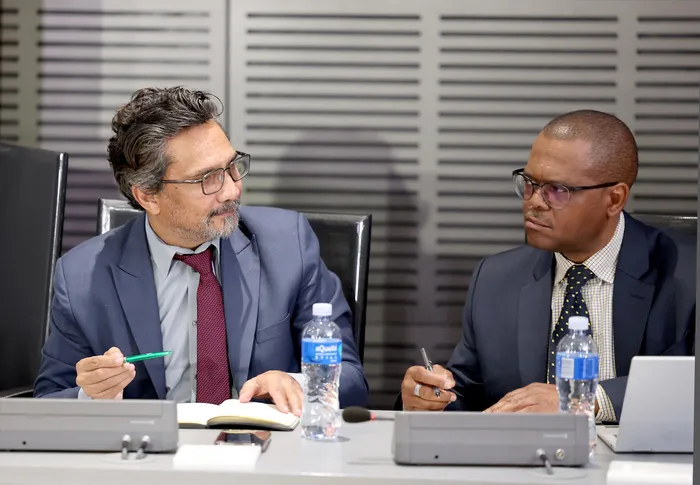South Africa eyes diversification as jobs exodus looms over 30% US import tariffs
US TARRIFS

Zane Dangor, the Director-General (DG) of the Department of International Relations and Cooperation (Dirco), speaking with Simphiwe Hamilton, the director-general of the Department of Trade, Industry and Competition (the dtic) during a press briefing led by Ministers Ronald Lamola and Parks Tau on the reciprocal US tariffs.
Image: GCIS
Banele Ginidza
About 30 000 jobs in various sectors are likely to be impacted by the unilateral 30% import tariffs to be imposed by the United States on South African products, which is set to come into effect before the end of this week.
This was announced on Monday as the government seeks to craft an export diversification strategy leaning heavily towards China's R20 billion market through the offered China-Africa Trade partnership and a special industrialisation memorandum of understanding exclusively with South Africa.
Simphiwe Hamilton, the director-general of the Department of Trade, Industry and Competition (the dtic), confirmed that thousands of jobs were on the line in a variety of industries that export goods to the US market.
“We base this on the ongoing consultation that we have with all the sectors of the economy, from automotive to agriculture, and all the other sectors that are going to be affected, and at this stage, we are sitting at approximately 30 000 jobs that could be affected by this,” Hamilton said.
The dtic and the Department of International Relations and Cooperation (Dirco) said the 20% increase on top of the basic 10% tariff may shave off 0.2% of South Africa’s economic growth, with the reduction in growth depending on SA's ability to find alternative markets.
Trade Minister Parks Tau said it was mildly comforting that 35% of SA exports remained exempted from the tariffs with the exceptions published in the previous US Executive Order to remain in force.
The exceptions cover products such as copper, pharmaceuticals, semi-conductors, lumber articles, certain critical minerals, stainless steel scrap, energy and energy products.
Tau said the impact of the tariff was still subject of scrutiny with various conclusions, citing AgriCulture South Africa reporting an understated impact than initially modelled.
"Drawing a straight line is a mistake we all have been making over the past few months when we are saying the auto sector is going to be affected and can't export to the US market," Tau said.
"But when you drill down to the detail, most of the Original Equipment Manufacturers (OEMs) in the country do not go into the US market. So you have to go to the OEM that goes into the US market to determine what percentage of products [is exported to the US] to then determine impact.
Last month, US President Donald Trump stated that the 30% tariff was "necessary to correct the many years of South Africa’s Tariff, and Non Tariff, Policies and Trade Barriers," blaming Pretoria for what he called "unsustainable Trade Deficits against the United States."
However, Tau and Dirco Minister Ronald Lamola said the calculation of US-SA "trade deficit" ignored the substantial US trade surplus in services, as well as the complementary nature of the bilateral trade and investment relations between the two countries.
"South African exports do not compete with US producers and do not pose a threat to the US industry," they said in a joint statement.
As a result, the government has embarked on the diversification of markets and strengthening trade and investment partnerships with various trade partners, targeting markets across Africa, as well as in Asia, Europe, Middle East, and Americas.
"Our announcement on the Clean Trade and Investment Partnership with the European Union in March has unlocked a R90 Billion Investment Package that has been initially committed," read the statement.
"This Clean Trade and Investment Partnership also aims to unlock new market access opportunities for South Africa, including the export of Sustainable Aviation Fuel (SAF) by Sasol and the exports of hybrids and Electric Vehicles.
"While facing global trade challenges, South Africa is proactively building a more resilient agricultural sector. We've made significant progress in opening up vast new markets like China and Thailand, securing vital protocols for products like citrus and others."
The government said that with China alone being a $200bn market, South Africa was confidently expanding its reach and creating new opportunities for agricultural producers.
"We're making significant inroads into new, high-growth markets across Asia and the Middle East, including the UAE, Qatar, and Saudi Arabia. We have also developed a number of Trade and Investment Packages with a number of countries, including Japan that aim to unlock new market access opportunities," it said.
"While the current measures present challenges, it also presents opportunities to build and accelerate the implementation of the African Continental Free Trade Agreement and to develop new partnerships in markets that have remained untapped, including ASEAN and Turkiye."
BUSINESS REPORT